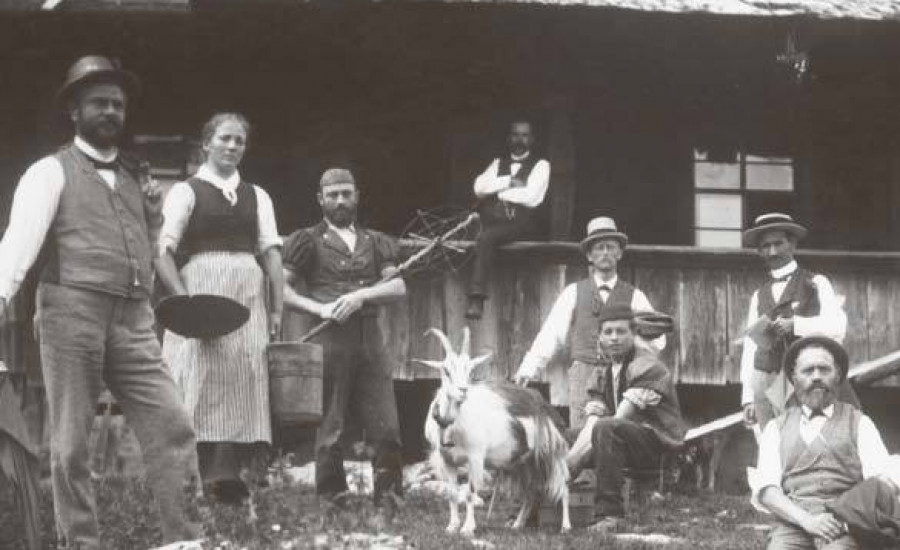HISTAGRA participa no Rural History 2013 que se celebra no mes de agosto en Berna

Rural History 2013 celebrase no marco da Organización de Historia Europea Rural (EURHO). Organizada pola Swiss Rural History Society (SRHS) e os Archives of Rural History (ARH) en Berna, celebrándose na University of Bern a partir do 19-22 de agosto de 2013.
O obxectivo principal da conferencia é proporcionar unha descripción do estado da Historia rural na actualidade. Outro obxectivo é o de reforzar as redes existentes e a cooperación de historiadores rurais e as súas institucións. A conferencia será unha ocasión excelente para que os historiadores podan debater sobre a cuestión clásica da historia rural, crucial para o porvir do desenvolvemento nunha era de urbanización mundial.
O grupo HISTAGRA participará no Rural History 2013 nos seguintes paneis:
29
Knowledge networks in rural Europe 1700-2000
Panel organiser: Prof. Segers, Yves, University of Leuven, Interfaculty Centre for Agrarian History
Contact: yves.segers ( o ) icag.kuleuven.be
Abstract: The diffusion of various forms of knowledge and know how in the countryside, both to increase agricultural production and food quality and to improve the quality of rural life, was without any doubt one of the most striking processes of change in the rural areas of Europe during the last three centuries. However, regions, farming communities and farming families had unequal access to locally and externally generated knowledge, as well as unequal abilities to produce and acquire new knowledge through formal and informal networks such as learning by doing, schooling, extension programmes, media, etc. These two sessions, organised under the same umbrella, aim at unravelling the development of what can be called "agricultural and rural knowledge networks" in Europe. One session will address the production and diffusion of agricultural science and agricultural technology. Changing agricultural knowledge and techniques were one of the principal reasons for the increases in agricultural output that occurred since the eighteenth century. Many of the technical changes resulted from the activities of governments, scientists and commercial firms outside the agricultural industry itself. Others came from pioneering farmers. The second session will focus on the diffusion of knowledge in the countryside, e.g. how various forms of new knowledge affected the social and cultural way of life in rural areas such as literacy, the spreading of 'news', the home and family life, manners and modes, etc. Guiding questions for both sessions are: How did these knowledge networks operate: top-down, bottom-up or two-way communication? What was the role of public and private actors (government, state agronomists, farmers' organisations, commercial firms, media, the church, etc.)? Who had access to which knowledge? To whom was the available information addressed (men, women, youth; professional farmers or rural dwellers)? Which knowledge was adopted or rejected and why? How efficient was the degree of agricultural extension initiatives? Did inclusion or exclusion from knowledge networks influence power structures? Which channels were used to diffuse knowledge (education, newspapers, radio, films, television, journals, books, lectures, advertisements, expositions, agricultural shows, etc.)? To what extent was knowledge, generated outside Europe, imported in Europe, for instance from the U.S. and European colonies? Or vice versa? To what extent did knowledge networks globalise? (This is a two-panel session.)
Already known contributors: Paul Brassley, Yves Segers, Leen Van Molle, Daniel Lanero, Lourenzo Fernandez Prieto
39
Agricultural politics in Europe between WWII and 1957
Panel organiser: Prof. Pan-Montojo, Juan, Universidad Autónoma de Madrid
Contact: juanluis.pan ( o ) uam.es
Abstract: The proposed session is a two-part panel with contributors representing various parts of Europe. The overall aim is to discuss and compare agricultural politics in the early years just after World War II, and the two panels will bring international and national approaches together in a comparative perspective. Beginning in 1945, or even with the Hot Springs Conference in 1943, and ending in the late 1950s before the creation of CAP, the session will highlight times and processes that have often been overshadowed by wartime food and farming, and by the introduction of the CAP. More than a decade passed in between, however; a decade that saw new political climates, the emergence of the Cold War, and the implementation of new national agricultural programmes in many European countries. Early post-war agriculture can be studied from an international perspective that brings to the forefront the international context of the 1940s and 1950s; the reorganisation of food exchanges; bilateral agreements, and agrarian policies, including the development of the FAO and the programmes designed within the framework of the Marshall Plan. Post-war agriculture can also be examined from the national perspective by looking at national food production, structural policies, and market regulations. Agricultural policies cannot, however, be analysed without taking into account more general political factors: the new understanding of socio-political integration and the role of farmers/peasants after the experience of the 1930's and the war; the electoral realities of various political forces and the reshaping of political coalitions in European democracies; the ruralist discourse of Southern-European authoritarian regimes; and the position of peasant parties in "popular democracies". Among the many issues to discuss are: When and how were agricultural programmes worked out? What were their short and long-term purposes? What role did agricultural organisations and factors play in the political coalitions after the war? What was the impact of pre-war plans, war-related agricultural problems and the Marshall Plan at the international, national and local level? What were the technological trends and policies across Europe and how did the US influence these trends? How did agricultural productivity, food supply and nutritional standards change during the first decade after the war? Did newly introduced policies favour agriculture, or were industry and urbanization given priority at the expense of farming and rural societies? (This is a two-panel session, organised by Pan-Montojo, Juan and Martiin, Carin.)
Already known contributors: Griffiths, Clare; Martin, John; Gerhard, Gesine; Martiin, Carin; Freire, Dulce; Fernández Prieto, Lourenzo